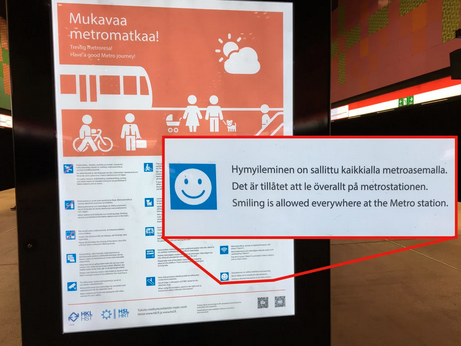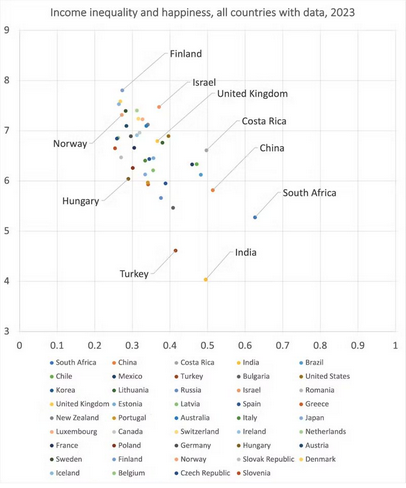Have you ever stopped to notice how strangers interact in public? In Brazil, nearly every Brazilian will smile at strangers when crossing them in the street. In this article, I will be calling this the ‘smiling factor’. The smiling factor in Brazil is not a question of just looking friendly, or conveying you are having a good day, but a social expectation. If someone were to cross the streets looking at others’ eyes and not smiling at them, that person would be perceived as rude or insensible. Even further, if a Brazilian smiles at someone and the latter just walks away poker-faced, the Brazilian will likely feel tremendously offended. In my experience in the United States, the smile factor was not dramatically different. Of course, I will occasionally get ghosted when I smile at strangers or stared at by a very unsmiling face, but at most times, people smile at me and I smile back.
What had not really occurred to me was how in other places around the globe, the smiling factor could not be the same. After watching a video of a Brazilian girl living in Japan who said that there people do not smile at each other at all, it occurred to me that in other places around the globe, the smiling factor could vary widely. Needless to say, I was very intrigued by the video and decided to dig more into the subject. The blog “Is It Rude To Smile In Japan?“, by Kenbo, answers the title’s question by saying “While it is not rude to smile in Japan, it may be off-putting.” The article informs that smiling at a stranger in Japan may cause them to think you are disingenuous, being flirtatious, or they will find you bizarre. The article The Meaning of a Smile in Different Cultures brings up that while Americans value emotional openness and feeling broadcast, the Japanese culture suppresses emotions to improve relationships with others, consistently displaying fewer expressions using the mouth.
The article “Why Americans Smile So Much“, by Olga Khazan, displays a Reddit post about smiling in Finland in which the user claims that when a person smiles at a stranger in the country, others assume that either A)They are insane, B)They are drunk, or C)They are American. By exploring the internet, I found a picture of a metro sign in Finland that reads “Smiling is allowed everywhere in the metro station”. This conveys that smiling in the metros is so unusual that there has to be a sign guaranteeing that it is legal! Why is it that the Finnish smile so little in public? It can not be because they are unhappy; they are ranked top #1 in the World Ranking of Happiness, after all!

A metro station in Finland claims it is allowed to smile.

Font: World Happiness Report/OCDE
Sophomore Naysha Jain says that in India, where she was born and raised, smiling at strangers is not common, but it is perceived as something neutral.
“It’s not like you have to smile at others when you cross the street, but they don’t judge you if you do or do not. If you make eye contact with someone by mistake, then yes, you smile, but usually people try to not make eye contact with each other,” Jain said.
India is ranked No. 132 from 142 in Happiest Countries in The World 2023. Lebanon, ranked second to last (141st) in the same rank, is recognized for being welcoming and friendly to strangers. The video Why Lebanese People Want Me To Smile? by the YouTube channel Alan’s Theory, displays Alan Wurman, a traveler who visits Beirut and is surprised at the number of smiles he receives from the Lebanese, considering the severe economic crisis in the country and a recent accident that made 300,000 people lose their homes.
“Before coming here I was expecting to find a depressed society, but instead I found smiles! Everywhere I go people smile at me. They show me what they are building and they show a very positive attitude,” Wurman said.
When comparing the happiness rankings of the United States (ranked 15th in happiness around the globe), and Japan (ranked 54th), it is possible to hypothesize that the happier a nation is, the more people will smile. Nevertheless, the theory stops making sense once we check the comparisons of Brazil’s (ranked 38th in happiness), India’s (ranked 132nd), and Lebanon’s (ranked 141st) happiness levels to their smiling factors. Why is it that people seem to smile more in less-happy countries like Brazil, India, and Lebanon than in the happiest country in the world (a.k.a Finland) My answer is that the smiling factor has little to do with happiness.
I have two theories for the divergence of the smiling factor within different countries. The first is cultural aspects and social norms. Each country has its ideas about what is acceptable in public and what is not. The article Happy or Sad? Emotional Cues Vary By Culture by NBC News approaches the cultural expectations in Japan of suppressing one’s emotions. The researcher Masaki Yuki explains that Japanese tend to shy away from overly displaying their emotions, and rarely smile or frown with their mouths. A Finnish user responded in the article Finnish Etiquette In Public Situations-What Does It Mean, by Clint:
“Hi, Clint! I’m from Finland and I can tell you’re right. We don’t smile or say hi to strangers. But I think it’s just a part of our manners. As you know, we really respect our privacy and expect to other people do that, too. It’s polite to leave people alone and let them do whatever they are doing without “disturbing” them.”
My second theory for the smiling factor to be higher in some nations and lower in others is criminality. In countries with higher criminality rates, such as Lebanon, ranked in the 15th most elevated position of the Crime Rate by country 2023, Brazil ranked in the 22nd position, and the United States, ranked 66th, people may smile more to convey a feeling of assurance and safety to others around them. It is as if they were saying, “See? I can’t be dangerous if I am happy.” In countries with lower criminality rates, like Japan, ranked 117th, and Finland, ranked 178th, there is no need to prove to others that you are not harmful to ease the tension, therefore people tend not to smile as much at each other.
Even though only two theories were listed in this article, many factors are responsible for the variance of the smiling factor within different countries. The number of immigrants, individualism, collectivism, and other fancy names can all be responsible for this phenomenon. Whether we have an answer to the question or not, it is fascinating to observe how in some cultures a smile can dissolve tension, while in others it can construct it. The frequency with which you smile was created by a series of social norms, built over centuries of history. Isn’t it impressive that our faces can carry all this weight?







